2025 Technical Fellowship awarded Fellows
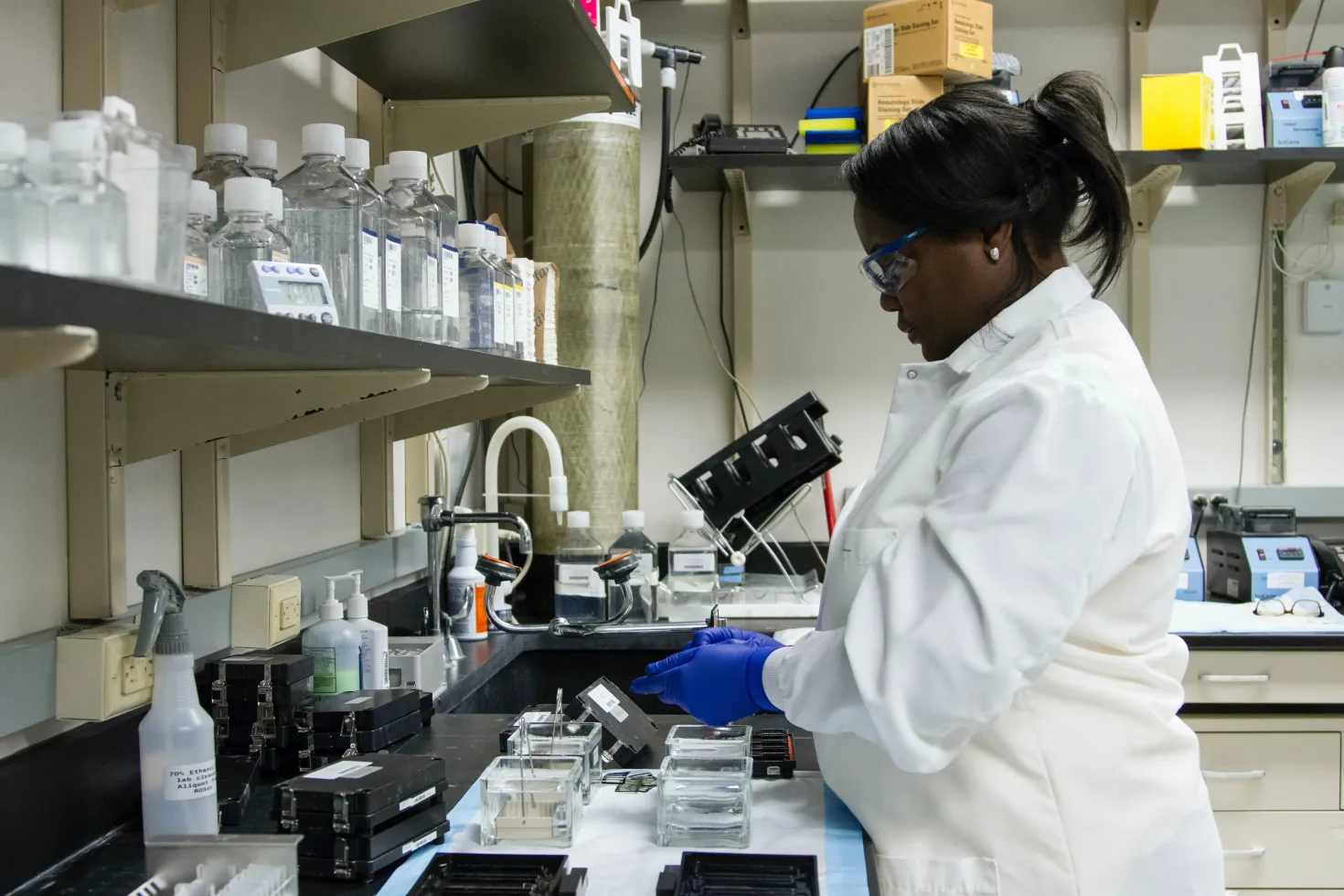
UICC’s Technical Fellowships program enables cancer professionals to travel to a host institution for up to two months to learn new knowledge and skills, and to build capacity in their home countries. From the program’s start in 1976, Fellowships have provided individuals the chance to share best practices in cancer treatment and prevention. Below you will find the details of our awarded Fellows for 2025, including their home and host institutions and countries, and a description of their project.

Andyta Nalaresi Hartono, Dharmais National Cancer Hospital, Indonesia
Host Institution: International Agency for Research on Cancer/WHO, France
Project title: UICC-IARCDEVFEL Improving implementation of breast cancer screening in Indonesia
Topic: Cancer prevention and early detection strategies, including vaccination and cancer screening
Breast cancer is the most commonly diagnosed cancer among women in Indonesia, with many cases detected at advanced stages due to limitations in early detection. Clinical breast examination (CBE) is the primary screening method, yet its low positive predictive value might result in unnecessary referrals, diagnosis delays, and strain on diagnostic services. A pilot study, conducted by the National Cancer Center Dharmais in collaboration with the International Agency for Research on Cancer (IARC), is evaluating the use of point-of-care ultrasound to triage women with positive CBE results. Preliminary findings suggest ultrasound can significantly improve triaging accuracy and reduce diagnostic burden.
This fellowship project aims to strengthen monitoring and evaluation of the pilot by developing a data monitoring and statistical analysis plan, assessing program quality using CanScreen5 indicators, and formulating a policy brief with a monitoring framework to support national implementation. Through a one-month fellowship at IARC, best practices in cancer screening evaluation and implementation science will be applied to the Indonesian context. The outcomes will inform the National Cancer Control Plan, support equitable access to timely diagnosis, and contribute to sustainable program scale-up. This work aims to improve the coverage, quality, and impact of breast cancer screening in low-resource settings.

Atukuzwe Kahakwa, Cancer Care Centre, Kilimanjaro Christian Medical Centre (KCMC), Tanzania
Host Institution: International Agency for Research on Cancer (IARC), France
Project title: Implementation of a Breast Cancer Suspicion Model for Primary Healthcare Workers
Topic: Cancer prevention and early detection strategies, including vaccination and cancer screening
Breast cancer is the second leading cause of cancer-related deaths among women in Tanzania, with delayed diagnoses being a significant contributor, especially in rural areas. This project aims to improve early detection by implementing a paper-based Breast Cancer Suspicion Model for primary healthcare workers (PHWs) in Kilimanjaro. The model will empower PHWs with a 10-point scoring system, helping them assess and triage suspected breast cancer cases systematically. The Suspicion Model uses a structured, easy-to-use paper tool to assess common symptoms like lumps, skin changes, and discharge, with each symptom assigned a score to prioritize referrals for specialized diagnostic services.
This fellowship at IARC will allow me to gain essential methodological skills in study design, local modelling, and evaluation. I will also collaborate with IARC’s multidisciplinary teams to refine the model, ensure its accuracy, and evaluate its effectiveness in a real-world context. By integrating IARC's expertise in early detection, model prediction, and evaluation, I will develop a refined version of the Suspicion Model that can be scaled nationally in alignment with the WHO Global Breast Cancer Initiative.
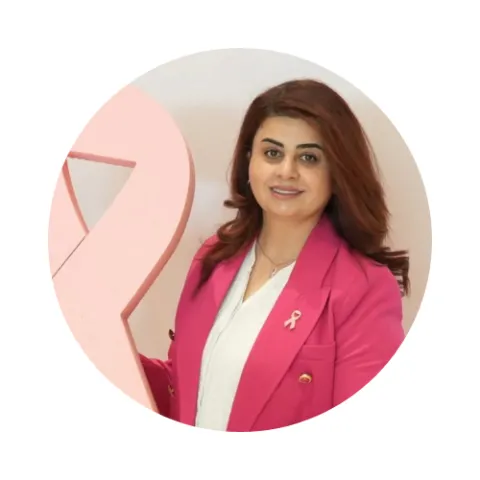
Chinar Mustafa, Cancer support fund, Iraq
Host Institution: University Hospital Federico Il, Naples, Italy
Project title: Breast cancer surgery observership (oncoplastic & sentinel LN biopsy)
Topic: Cancer diagnosis, prognosis and treatment (including observerships in cancer surgery, radio- and chemotherapy and medical oncology)
Breast cancer is the most common malignancy among women globally. In my country, Iraq, and specifically within the Kurdistan Region, it accounts for approximately 23% of all registered cancer cases. Alarmingly, a significant proportion of these cases occur in younger women, making both oncologic safety and cosmetic outcomes essential components of effective treatment.
Unfortunately, there remains a significant gap in the application of updated breast surgery techniques in our region—particularly in the areas of oncoplastic breast surgery and sentinel lymph node (SLN) biopsy. The majority of breast cancer patients still undergo traditional surgical methods, including full axillary dissection, which significantly increases the risk of complications such as chronic lymphedema.
Through this UICC Fellowship, I seek to undertake an observership in a specialized breast cancer with a focus on SLN biopsy and oncoplastic breast surgery. That will enable me to improve both the oncological safety and cosmetic outcomes for my patients, particularly young women, and significantly reduce treatment-related morbidity.
Upon completion of the fellowship, I am committed to applying and sharing the acquired knowledge in my region—supporting capacity building, advancing surgical standards, and ultimately improving the quality of breast cancer care for our population.
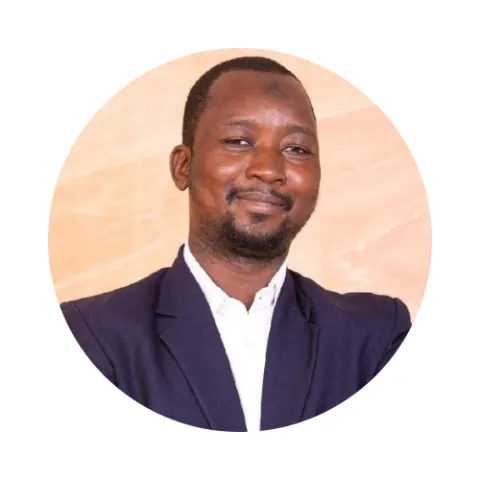
Djibril Teonsa, Registre du Cancer de Ouagadougo, Burkina Faso
Host Institution: International Agency for Research on Cancer, France
Project title: UICC-IARCDEVFEL Development of Cancer Screening Registry with interoperability
Topic: Cancer prevention and early detection strategies, including vaccination and cancer screening
This project aims to establish a DHIS2-based cervical cancer screening registry that can later expand to breast, and colorectal cancer across Sub-Saharan Africa. Many countries in the region already collect health data using DHIS2, a widely used open-source platform. However, screening data are often incomplete, scattered, and not linked to cancer diagnosis or outcomes.
The goal is to design a standardized DHIS-2 framework that records the full screening pathway, from the screening test administration and result, assessment of screen-positive women, confirmatory diagnosis and treatment initiation (for precancer and cancer cases), while linked to national cancer registry. This will help health authorities monitor the effectiveness of screening programs, ensure follow-up for patients, and make better decisions to improve early cancer detection.
The project aims also to build a framework for interoperability with the population-based cancer registry (CanReg5) by following international health data standards to ensure compatibility across the two systems. With support from IARC and WHO, the project will produce practical tools and protocols that can be adapted to different country contexts.
This initiative will support the fight against cancer by ensuring that screening programs are not only implemented but also monitored, evaluated, and improved based on real data.
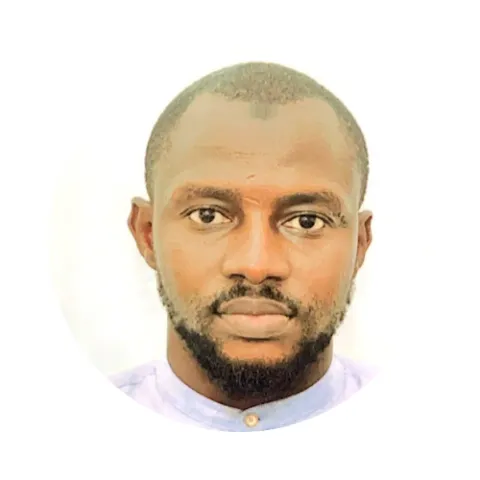
Elhadji Malick Mokhsine Diallo, Centre Antoine Lacassagne, Senegal
Host Institution: Centre International de Cancérologie, France
Project title: Stage de radiothérapie des cancers gynécologiques et mammaires
Topic: Cancer diagnosis, prognosis and treatment (including observerships in cancer surgery, radio- and chemotherapy and medical oncology)
Dans le cadre de mon stage en cancérologie, je me suis intéressé aux cancers gynécologiques et mammaires, une problématique majeure de santé publique au Sénégal. Mon projet visait à améliorer la prise en charge de ces cancers chez les femmes sénégalaises.
J'ai travaillé sur l'analyse des données cliniques et épidémiologiques des patientes atteintes de ces cancers, afin d'identifier les facteurs de risque et les défis liés à leur prise en charge. J'ai également participé à la sensibilisation et à l'éducation des patientes et de leur famille sur l'importance du dépistage précoce et de la prévention.
Ce stage m'a permis de développer mes compétences en recherche clinique et en santé publique, tout en contribuant à l'amélioration de la santé des femmes sénégalaises. J'espère que les résultats de mon projet pourront être utilisés pour informer les politiques de santé publique et améliorer la prise en charge des cancers gynécologiques et mammaires dans mon pays."

Enkhjargal Bayarsaikhan, National Cancer Center of Mongolia, Mongolia
Host Institution: National Cancer Center Korea, South Korea
Project title: Strengthening Molecular Oncology Diagnostics in Mongolia through NGS
Topic: Cancer risk factors including behavioural, occupational, environmental, medical and inherited genetic factors
The primary purpose of this fellowship is to gain comprehensive, hands-on experience in the application of Next-Generation Sequencing (NGS) technologies for genetics risk factor for cancer and cancer diagnostics, with the ultimate goal of implementing these techniques in Mongolia’s clinical and laboratory settings.
Specifically, my objectives are:
1. To acquire practical skills in NGS workflows, including sample preparation, DNA/RNA extraction, library preparation, sequencing, and data analysis for oncologyrelated genetic mutations.
2. To understand the clinical application of NGS results, particularly in identifying actionable mutations such as hereditary genetics risk factors breast, colon and other cancers. On the other hand cancer target therapy related mutation analysis EGFR, ALK, KRAS, BRAF, and ROS1 in patients with solid tumors, especially lung and colorectal cancers.
3. To study quality assurance, reporting standards, and clinical interpretation of NGS data in a multidisciplinary cancer care setting.
4. To develop a practical and sustainable implementation plan for introducing NGSbased diagnostics in my home institution, including training programs for local staff and integration into existing cancer care pathways.
5. To initiate international collaboration with the host institute in Korea for future knowledge exchange, joint projects, and technical support.

Frank Nkhwazi, Kamuzu Central Hospital - National Cancer Center, Malawi
Host Institution: Ministry of Health, South Africa
Project title: Enhancing Record Linkage for Cancer Data at the Lilongwe Cancer Registry
Topic: Cancer registries and analysis of cancer data
Cancer remains a major health challenge in Malawi, with high rates of cervical and breast cancer. However, a key issue in cancer control is the lack of integration between screening programs and cancer registry data, making it difficult to track patient outcomes and improve early detection efforts.
This project aims to enhance record linkage between breast and cervical cancer screening data and the Lilongwe Cancer Registry data to improve cancer surveillance and patient follow-up. Through a one-month fellowship at the IARC-GICR Collaborating Centre in South Africa, I will gain expertise in record linkage methodologies, learning how to connect screening records with cancer registry data to ensure accurate tracking of cancer cases.
By applying these skills in Malawi, I will help bridge the gap between screening programs and cancer registries, ensuring that women at high risk receive timely follow-ups and treatment. This project supports national cancer control efforts, contributing to better data accuracy, early detection, and equitable access to cancer care.

Gloria Munnell, Western Highlands Provincial Health Authority, Papua New Guinea
Host Institution: Tasmanian Health Service, Australia
Project title: Integrated palliative care for women with advanced cervical cancer in PNG
Topic: Patient support, survivorship and palliative care
This project aims to strengthen access to palliative care for women with advanced cervical cancer in Western Highlands Province, PNG, where end-of-life care remains extremely limited. While HPV-based screening is expanding as part of the Western Highlands Province Health Authority (WHPHA) efforts to eliminate cervical cancer, many women are still diagnosed in advanced stages, with few treatment options and little support to manage pain or emotional and social suffering.
Through a 3 week fellowship in Launceston, Australia, under the mentorship of Dr. Odette Spruijt, a leading palliative care physician, with whom I’ve already had the privilege to connect with through the EPICC program. I will gain practical, clinical, and educational experience in hospital and community-based palliative care. Activities include ward rounds, home visits, team discussions, and teaching on cancer pain and holistic care.
The knowledge and skills gained will be applied to a pilot palliative care model at Mt Hagen Hospital, supported by the WHPHA. I will also deliver training to local health staff and volunteers to build capacity and improve awareness. This work will contribute to achieve the WHO cervical cancer elimination targets, by ensuring that women with incurable cervical cancer receive compassionate, culturally appropriate, and dignified palliative care.
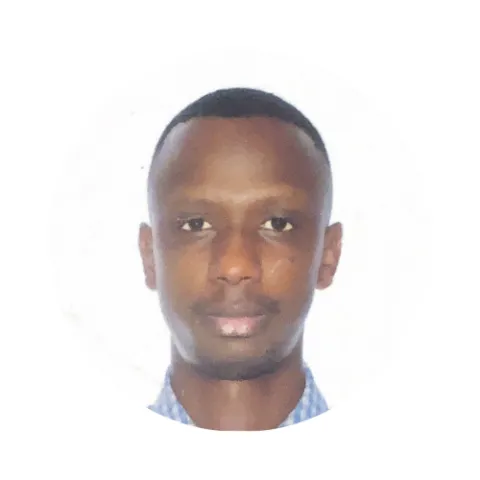
Jackson Muvunyi, Rwanda military Refferal and Teaching hospital, Rwanda
Host Institution: Princess Margaret Cancer Center, Canada
Project title: Advances in Breast Cancer: Emphasis on Breast Medical Oncology and MDT Function
Topic: Cancer diagnosis, prognosis and treatment (including observerships in cancer surgery, radio- and chemotherapy and medical oncology)
Rwanda reports around 8,800 new cancer cases and 6,000 cancer related deaths annually. Breast cancer accounts for roughly 20% of female cancers and ranks as the second leading cause of cancer mortality. Over 75% of breast cancer patients present at advanced stages, largely due to delayed detection and systemic barriers. The National Cancer Control Plan (2020–2024), soon to be updated, prioritizes prevention, diagnostic capacity, and workforce development. Key facilities include the Butaro Cancer Centre of Excellence, Rwanda Cancer Centre, King Faisal Hospital, and Kigali University Teaching Hospital. A national multidisciplinary breast cancer care model, introduced in 2019, has improved treatment coordination and retention but challenges persist particularly in human resource capacity and specialist training. A Breast Medical Oncology and MDT observership at Princess Margaret Cancer Centre (PMCC) will provide advanced skills in systemic therapies, MDT coordination, and evidence based care. This experience will empower me to strengthen integrated breast cancer services in Rwanda, train healthcare workers, support national guideline development, and lead quality improvement initiatives. Ultimately, the observership will contribute to reducing treatment delays, improving outcomes, and enhancing Rwanda’s role in global cancer control efforts.

Jaime Castillo Silva, Instituto Nacional de Salud Pública, Mexico
Host Institution: International Agency for Research on Cancer, France
Project title: Identifying New Breast Cancer Metabolic Markers in Young Latin American Women
Topic: Cancer risk factors including behavioural, occupational, environmental, medical and inherited genetic factors
Breast cancer is the leading cause of cancer death among young Latin American women, striking earlier and more aggressively than in high-income countries. To address this disparity, this fellowship will identify novel metabolic markers that aid targeted prevention in Latin American women aged 20–45. During a 30-day visit to the International Agency for Research on Cancer (IARC), I will perform statistical analysis on targeted metabolomics data from the PRECAMA study, Latin America’s largest case-control study of young women across Mexico, Chile, Colombia, and Costa Rica.
Using advanced statistical methods, I will identify metabolites linked to breast cancer risk and explore variations by tumor subtype. The project prioritizes capacity building: I will receive hands-on training in metabolomics data analysis, develop adaptable R code for future studies, and draft a workshop to share these techniques with colleagues at Mexico’s National Institute of Public Health (INSP). Findings will be prepared for publication to inform region-specific prevention strategies.
This work directly supports Mexico’s National Cancer Control Plan by uncovering biological drivers of early-onset breast cancer and equipping local researchers with tools to inform strategies that reduce the disease’s disproportionate burden on young women.

Kenneth Kiiza Rutikanga, Rwanda military Refferal and Teaching Hospital, Rwanda
Host Institution: Princess Margaret Cancer Center, Canada
Project title: Pioneering Allogeneic Stem Cell Transplantation in Rwanda
Topic: Cancer diagnosis, prognosis and treatment (including observerships in cancer surgery, radio- and chemotherapy and medical oncology)
The UICC Bone Marrow Transplant Technical Fellowship presents a timely and strategic opportunity to address this critical gap in Rwanda’s cancer care landscape. My primary objective is to acquire hands-on clinical skills and procedural knowledge in allogeneic bone marrow transplantation. This includes training in patient selection, conditioning regimens, stem cell harvesting and infusion, graft-versus-host disease (GVHD) management, and post-transplant care. Gaining knowledge and setting up a haploidentical stem cell transplant program that requires fewer resources than matched unrelated donor transplants—making it more suitable for a resource-limited setting like Rwanda. These goals are directly aligned with the vision of Rwanda Military Referral and Teaching Hospital, to serve as a national and regional center of excellence in specialized care, academic instruction, and medical research. This fellowship represents not only a key milestone in my professional development but also a foundational step toward expanding equitable, high-quality access to life-saving cancer treatments in Rwanda and similar low-resource settings.
Acquiring expertise in best practices for ensuring quality and safety in stem cell transplantation, with the goal of delivering safe and effective treatment to transplant patients in Rwanda.

Lucas Cunha, Federal University of São Paulo, Brazil
Host Institution: International Agency for Research on Cancer, France
Project title: “UICC-IARCDEVFEL” Admissions to ED for patients diagnosed with cancer in Brazil
Topic: Cancer registries and analysis of cancer data
Cancer diagnoses made during emergency department visits are often associated with advanced disease and poorer outcomes. In Brazil and many other countries, a significant portion of patients are diagnosed with cancer only after presenting to emergency care, which may reflect gaps in early detection and access to timely medical evaluation. This fellowship aims to explore the characteristics and outcomes of emergency cancer diagnoses using data from a large network of hospitals affiliated with SPDM – São Paulo Association for the Development of Medicine, a long-standing partner of the UNIFESP. The project will classify cases into three categories—true emergencies, incidental diagnoses, and interrupted diagnostic pathways—and investigate factors such as patient demographics, symptom profiles, and healthcare access. By analyzing these patterns, the study seeks to identify populations at risk of delayed diagnosis and uncover weaknesses in the healthcare system that could be improved. The fellowship at the International Agency for Research on Cancer (IARC) will provide advanced training in epidemiological methods, international comparisons, and cancer surveillance strategies. The knowledge gained will help inform policies to improve early cancer detection and reduce inequalities in access to care, ultimately contributing to better outcomes for cancer patients in Brazil and other countries facing similar challenges.

María Reneé Jiménez Sotomayor, Universidad Nacional Autónoma de México, Mexico
Host Institution: University of Colorado, United States of America
Project title: Building sustainable retinoblastoma care in Mexico: Fellowship at UCCC
Topic: Cancer diagnosis, prognosis and treatment (including observerships in cancer surgery, radio- and chemotherapy and medical oncology)
This UICC technical fellowship focuses on acquiring critical skills and knowledge to eventually establish a specialized retinoblastoma program in Mexico at Conde de Valenciana Hospital.
Currently, Mexican children with retinoblastoma face significant disparities in care, with diagnostic delays averaging 6-7 months and limited access to advanced treatments.
During my 5-week observational fellowship at the University of Colorado Cancer Center's Ocular Oncology Program, I will:
1. Learn diagnostic and treatment approaches under Dr. Scott Oliver's mentorship.
2. Study the organizational structure of their multidisciplinary care model (ophthalmology, pediatrics, oncology, genetics).
3. Develop skills in retinoblastoma classification and treatment planning through case discussions.
4. Identify adaptable strategies for resource-limited settings.
This foundational training will equip me with the necessary expertise to begin implementing standardized retinoblastoma protocols at my home institution, train colleagues in modern diagnostic techniques, and lay the groundwork for future program development
Through collaboration with the University of Colorado Cancer Center’s Global Oncology Program, I will also establish professional networks to support future program implementation. This fellowship represents a crucial first step toward improving retinoblastoma outcomes in my institution and in Mexico by building local capacity in ocular oncology.

Mariana Quatrin, Hospital Especializado en Pediatría Sor Maria Ludovica, Argentina
Host Institution: Hospital General Universitario Dr Balmis, Span
Project title: Estrategias de Secuenciación de Nueva Generación (NGS), en Leucemias Agudas
Topic: Cancer prevention and early detection strategies, including vaccination and cancer screening
Los análisis genómicos son de aplicación creciente no solo para estudiar la base molecular de diversas patologías humanas, sino también para el desarrollo y/o implementación de nuevos ensayos con valor pronóstico y predictivo en diversas enfermedades, particularmente en el cáncer adquirido como asociado a síndromes. La heterogeneidad de estas patologías requiere un diagnóstico integrado para un tratamiento personalizado. Estas nuevas tecnologías generan datos masivos que requieren no solo de herramientas preanalíticas y analíticas específicas, sino también de personal capacitado para el análisis e interpretación del gran volumen y complejidad de datos obtenidos. Las plataformas genómicas como los secuenciadores de nueva generación son imprescindibles en la medicina de precisión, que por la diversidad de genes involucrados es de gran importancia para la caracterización de las leucemias agudas. El objetivo del presente proyecto es lograr una sólida capacitación en el diagnóstico de las leucemias agudas, tendiente a su aplicación en el ámbito hospitalario de nuestro país, lo que permitiría lograr que estos estudios lleguen a un sector de nuestra población que, de lo contrario se ven privadas de un diagnóstico preciso, con el consiguiente beneficio que esto representaría para el paciente y el equipo de salud
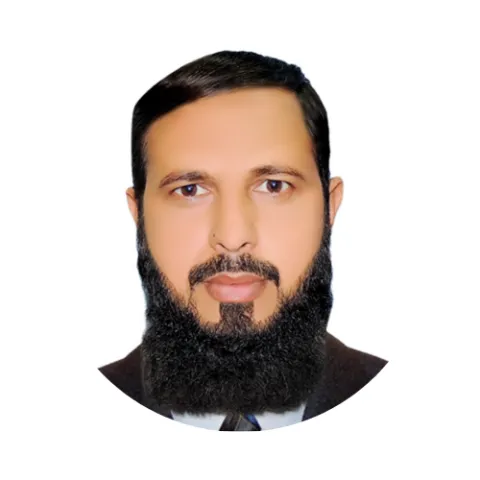
Muhammad Yaseen, Lady Reading Hospital Peshawar, Pakistan
Host Institution: Hammad Medical Corporation, Qatar
Project title: Enhancing Early Cancer Detection through IAEA Remote and Automated QC Program
Topic: Cancer prevention and early detection strategies, including vaccination and cancer screening
Cancer remains a major global health challenge, accounting for one in six deaths and nearly 20 million new cases in 2022. This burden is projected to rise by 77% by 2050. Early detection plays a critical role in improving survival, as many cancers are highly treatable if diagnosed at an early stage. However, the effectiveness of early detection relies heavily on the quality and consistency of imaging modalities such as mammography, radiography, fluoroscopy and CT.
Quality assurance (QA) and quality control (QC) procedures are vital to ensure accurate imaging and minimize radiation exposure. Unfortunately, in many low-resource settings, routine QA/QC practices are often overlooked due to the high cost of tools and infrastructure, posing significant challenges, especially in pediatric and breast cancer imaging.
To address this, IAEA has introduced a remote and automated QA/QC program with cost-effective phantoms and free software, making it accessible for public hospitals. Training of medical physicists in these protocols enhances their implementation, enabling consistent monitoring and improved imaging reliability supporting early cancer detection that might be missed due to inaccurate imaging.
Integrating automated QC systems not only lowers costs but also supports frequent, precise testing, ultimately strengthening early cancer detection and improving patient care outcomes.
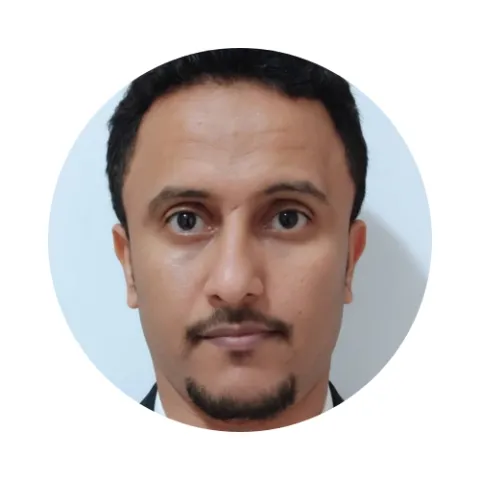
Mustafa Dhaiban, Shabwah Cancer Control Foundation, Yemen
Host Institution: International Agency for Research on Cancer, France
Project title: Adapting Cancer Registry Methodologies for Conflict-Affected Settings in Yemen
Topic: Cancer registries and analysis of cancer data
The ongoing conflict in Yemen has destroyed the health information system, creating a critical lack of data on cancer incidence. This lack of reliable data severely hinders national cancer control planning, resource allocation, and the implementation of effective early detection programs. This project aims to develop realistic framework for re-establishing cancer registration in a conflict-affected, low-resource setting by implementing a pilot project at Shabwah Oncology Center, with technical and resource support from Shabwah Cancer Control Foundation to foster collaboration between local civil organizations and public oncology centers to ensure sustainability. Through a one-month fellowship at IARC, I will acquire specialized skills in population-based cancer registration, data quality assurance and using of CanReg5 software, and methodologies for estimating cancer burden with incomplete data. The primary outcome will be a Standard Operation Procedures Manual tailored for Yemen, which will guide the creation of a pilot population-based cancer registry. This will provide the initial evidence needed to inform policy, strengthen health systems, and ultimately improve outcomes for cancer patients in Yemen.
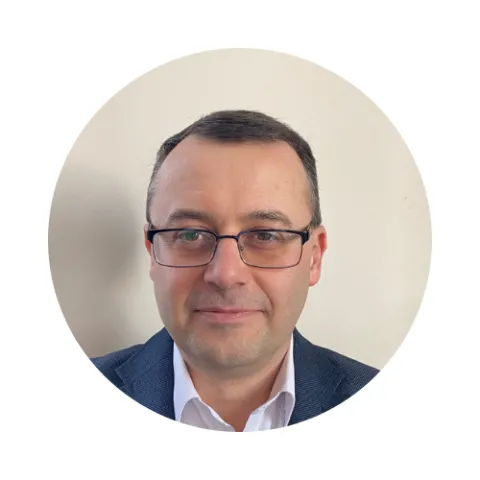
Nazar Lukavetskyy, Danylo Halytsky Lviv National Medical University, Ukraine
Host Institution: Erasmus University Medical Centre, Netherlands
Project title: Diagnostic and therapeutic endoscopy in gastrointestinal oncology
Topic: Cancer diagnosis, prognosis and treatment (including observerships in cancer surgery, radio- and chemotherapy and medical oncology)
This project focuses on improving the diagnosis and treatment of gastrointestinal cancers using endoscopic techniques. Many patients with cancers of the stomach, esophagus, or colon are diagnosed at late stages, when treatment options are limited. However, modern endoscopy offers a way to detect these tumors earlier and treat them less invasively.
During the fellowship, I will undergo specialized training in diagnostic and therapeutic endoscopy at a leading international center. I will learn advanced procedures such as endoscopic mucosal resection, submucosal dissection, and the management of gastrointestinal bleeding or obstruction caused by tumors.
By applying these techniques in Ukraine, we can improve early cancer detection, reduce the need for major surgery, and offer better care to patients with gastrointestinal cancer. The project will also help introduce international standards and practices into the Ukrainian healthcare system.
Ultimately, this training will benefit not only my own professional development, but also the wider medical community and patients in my country.
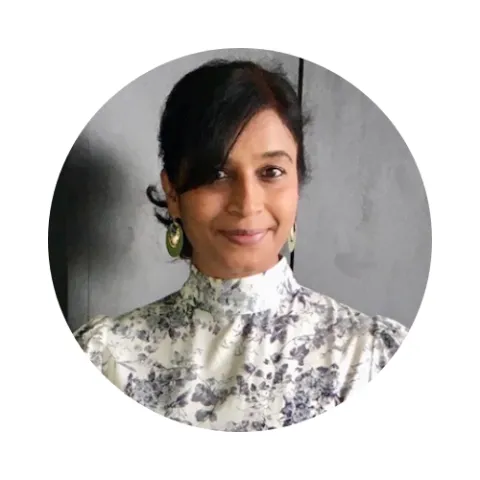
Nirmala Bhoo Pathy, Universiti Malaya, Malaysia
Host Institution: National Cancer Center Korea, South Korea
Project title: Adapting Korea’s Community Based Cancer Survivorship Care Model for Malaysia
Topic: Patient support, survivorship and palliative care
This fellowship aims to explore NCC Korea’s integrated cancer survivorship model, which bridges hospital-based multidisciplinary care with community-led rehabilitation through Reborn Centres. As cancer survival improves in Malaysia, our healthcare system faces increasing demand to support individuals living beyond cancer treatment. This project seeks to understand how Korea’s model supports diverse cancer survivors physically, psychologically, and socially. The goal is to translate these insights into a nationally adaptable, equity-focused framework for survivorship care across cancer types. This fellowship will strengthen my capacity to scale and institutionalize sustainable post treatment care models in Malaysia.
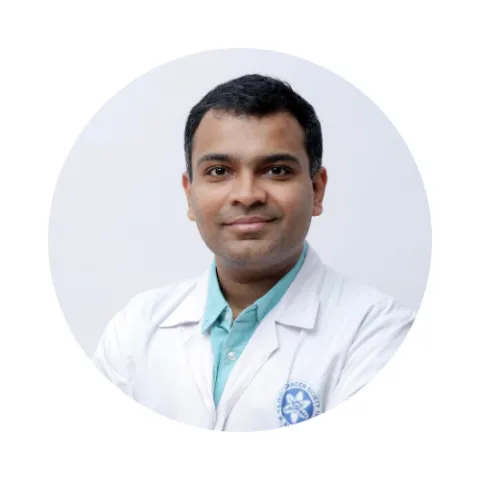
Nishant Madhani, Rajkot Cancer Society and Allied Hospitals, India
Host Institution: The Christie NHS Foundation Trust, United Kingdom
Project title: Accelerating Adoption of Hypofractionated RT for Prostate Ca in Indian setting
Topic: Cancer diagnosis, prognosis and treatment (including observerships in cancer surgery, radio- and chemotherapy and medical oncology)
Prostate cancer is one of the most prevalent malignancies in men globally, with an increasing burden in low- and middle-income countries (LMICs) like India. Long conventional radiotherapy schedules (7–8 weeks) place significant strain on patients and overburdened healthcare systems. Hypofractionated and ultrahypofractionated radiotherapy—including Stereotactic Body Radiotherapy (SBRT)—are evidence-based alternatives that offer shorter, cost-effective treatment without compromising outcomes.
This UICC Technical Fellowship at The Christie NHS Foundation Trust, UK, aims to build clinical expertise in implementing these modern protocols through hands-on exposure to IMRT, VMAT, and SBRT-based treatment planning, delivery, and quality assurance. I will observe patient selection, image-guided radiotherapy (IGRT), contouring, toxicity evaluation, and multidisciplinary care pathways.
Upon return, I will lead the adaptation of context-appropriate protocols at my home institution in India and initiate a prospective audit of 20–30 patients treated using the developed hypofractionation workflow. The audit will evaluate feasibility, toxicity, early outcomes, and patient convenience in a public-sector setting.
This project will promote evidence-based prostate cancer care, support scalable practice transformation, and improve access to efficient, high-quality radiotherapy in resource-constrained environments.

Olalekan Olasehinde, Obafemi Awolowo University, Nigeria
Host Institution: Queen Elizabeth II (QEII) Health Sciences Centre in Halifax, Nova Scotia, Canada
Project title: Enhancing Breast Cancer MDT operational performance in a Nigerian hospital
Topic: Cancer diagnosis, prognosis and treatment (including observerships in cancer surgery, radio- and chemotherapy and medical oncology)
I am a surgeon in Nigeria focusing breast cancer care. At my hospital, we initiated a Breast Cancer Multidisciplinary Team (MDT) in March 2025 which i coordinate. This team brings together specialists like surgeons, oncologists, nurses, and radiologists to plan the best care for each patient. While the team has helped improve coordination, there is still a need to better standardize processes, improve operational performance and institute structures that ensure sustenance. Also, our hospital wants to develop an integrated breast health clinic where all services such as diagnosis, surgery, cancer treatment, and support are offered in one place. This can help avoid delays and challenges in providing seamless, continuous care for patients.
Through this fellowship, I will visit a hospital with a well-established MDT and integrated breast health clinic to learn how they manage these services effectively. I will observe how the team works, how patients move through the clinic, and how clinical guidelines are utilised in the taking clinical decisions.
Afterwards, I plan to use these insights to improve our MDT and develop an integrated breast health clinic at my hospital. This will help deliver better, faster, and more coordinated care to all breast cancer patients.
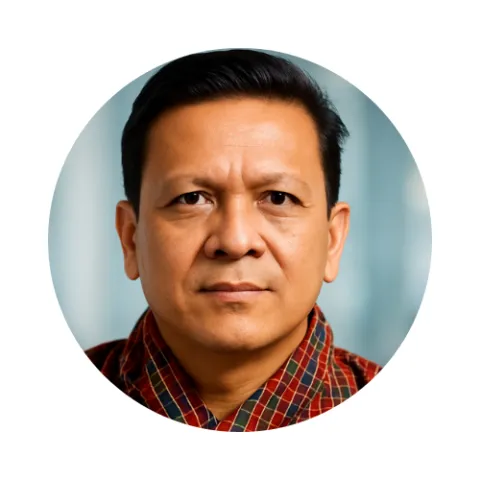
Prabhat Pradhan, National Medical Service, Bhutan
Host Institution: National Cancer Center Korea, South Korea
Project title: Enhance skill in Laparoscopic radical surgery in gastric and colorectal cancer
Topic: Cancer diagnosis, prognosis and treatment (including observerships in cancer surgery, radio- and chemotherapy and medical oncology)
Gastric and colorectal cancers and commonly performed operation in Bhutan. Reason unknown these cancers are these days seen more in younger age groups. Bhutan being the low income country experts to manage and the equipment are limited. More frequently the cancers are detected at later stages of disease.
Fortunately through the help from Japanese government, the Bhutanese doctors are being trained for past 4 years in early detection of gastric cancer using magnified endoscope. Hence, we are now detecting more number of early gastric cancer. But the management option is only open surgery due to lack of skills and equipment giving inherent problems which could be avoided by laparoscopic approach.
We are also very soon providing colonoscopy training to the surgeons with support from SingHealth, Singapore from September 2025. We hope to diagnose more number of early colorectal cancer detection.
Therefore, this is the right time to receive laparoscopic training on both gastric and colorectal cancer so that our young patients do not have to bear the ordeals of open, more deforming surgery.

Renata Oliveira Maciel Dos Santos, National Cancer Institute Brazil, Brazil
Host Institution: International Agency for Research on Cancer, France
Project title: Technical support for breast cancer early detection implementation in Brazil
Topic: Cancer prevention and early detection strategies, including vaccination and cancer screening
The project aims to improve early breast cancer detection in Brazil by addressing both the country’s high disease burden and low screening coverage, particularly among vulnerable populations. Led by the National Cancer Institute (INCA), the initiative will develop a technical support methodology to strengthen the implementation of early detection strategies across diverse local settings.
Using the RE-AIM framework (Reach, Efficacy, Adoption, Implementation, Maintenance), the project will support local health managers in analyzing key performance indicators, identifying barriers, and applying evidence-based solutions. Activities will include technical meetings, performance indicator reviews, and joint planning to enhance screening coverage, promote timely diagnosis, and improve access to treatment.
With a strong focus on equity, the methodology is designed to integrate improved practices into routine health management, ensuring long-term sustainability. The project will also provide technical materials and capacity-building opportunities, contributing to a more organized and effective breast cancer screening program nationwide.
This initiative is aligned with Brazil’s national breast cancer screening guidelines and builds on situational analyses to define targeted, evidence-informed strategies for strengthening early detection efforts.
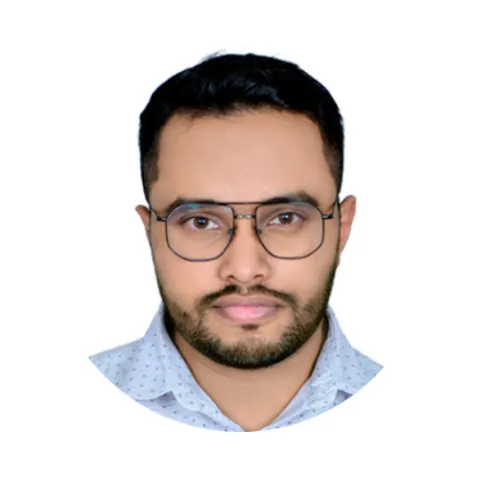
Rishi P Nair, All India Institute of Medical Sciences Jodhpur, India
Host Institution: Peter MacCallum Cancer Centre, Australia
Project title: Developing technical expertise for SABR Implementation in solid organ cancers
Topic: Cancer diagnosis, prognosis and treatment (including observerships in cancer surgery, radio- and chemotherapy and medical oncology)
This project aims to bring cutting-edge cancer treatment to India by developing expertise in Stereotactic Body Radiotherapy (SBRT), also known as SABR. SBRT is a highly targeted radiation technique proven to improve survival in patients with limited metastatic cancer, as shown in global studies like the SABR-COMET trial. Compared to costly drug treatments, SBRT is more affordable, requires fewer hospital visits, and is safer and more accessible for patients. This will help us in catering to the majority of the population in our region who often cannot afford the more expensive newer drugs.
This training at PMCC will help me gain in-depth knowledge of patient selection, treatment planning, and delivery for common cancers. By focusing on prostate, lung, breast and other oligometastatic sites, the project seeks to bridge the equity gap in Indian oncology, leveraging SABR as a cost-effective, high-impact modality that improves both survival outcomes and quality of life. The fellowship will translate global evidence and best practices into local action, aligning with UICC’s mission of knowledge transfer, capacity building, and reducing cancer-related inequities. This experience will help establish a high-quality SBRT program at AIIMS Jodhpur, a modern cancer care centre in India.

Ruth Manwele, Ocean Road Cancer Institute, Tanzania
Host Institution: University of California San Francisco, United States
Project title: Advancing 3D Brachytherapy for Cervical Cancer
Topic: Cancer diagnosis, prognosis and treatment (including observerships in cancer surgery, radio- and chemotherapy and medical oncology)
Tanzania is among the most burdened countries with cervical cancer. Cervical cancer is the leading cause of cancer related morbidity and mortality in Tanzania. Access to timely per protocol radiotherapy and adherence to treatment is a challenge to many. most patients presenting at advanced stages requiring both external beam radiotherapy and intracavitary brachytherapy. While high-dose-rate (HDR) brachytherapy is available at Ocean Road Cancer Institute (ORCI), the majority of treatments still rely on conventional 2D planning, which limits tumor control and increases toxicity to surrounding organs. The institute is now transitioning to 3D brachytherapy which offers better outcome and reduced treatment side effects.
This fellowship aims provide hands-on training in 3D image-guided brachytherapy at the University of California, San Diego (UCSD) by observing clinical workflow, practicing contouring, evaluating treatment plans, and identifying practical strategies for implementation in low-resource settings like. Skills acquired will directly support ORCI’s transition to 3D brachytherapy, and contribute to my professional development as a clinical oncologist. Additionally, knowledge dissemination through structured training sessions, protocol updates, and ongoing mentorship. This initiative aligns with Tanzania’s National Cancer Control priorities and addresses critical gaps in access to high-quality, evidence-based cervical cancer care

Sharif Folorunso, Obafemi Awolowo University, Nigeria
Host Institution: Memorial Sloan Kettering CC, United States
Project title: Adapting PRO Tools To Monitor Adverse Effects of Chemotherapy for Breast Cancer
Topic: Cancer diagnosis, prognosis and treatment (including observerships in cancer surgery, radio- and chemotherapy and medical oncology)
Chemotherapy related adverse effect (AEs) is a major reason for delay initiation and poor compliance to chemotherapy. Monitoring these symptoms is a major challenge in Nigerian cancer clinics due to limited staffing, high patient volumes, and the absence of structured follow-up tools. Patient-Reported Outcome (PRO) systems have been shown to improve early detection of AEs, reduce emergency visits, and enhance patient-centered care. However, these tools are rarely used in low-resource settings.
This project aims to adapt and pilot a PRO-based symptom monitoring tool for breast cancer patients undergoing chemotherapy at a Nigerian tertiary center. The tool will be implemented in both paper and mobile formats, with plans to integrate it into the hospital’s electronic medical record system.
During the UICC fellowship at Memorial Sloan Kettering Cancer Center, I will receive training in PRO tool development, implementation science, and digital health integration. I will work with global oncology experts to adapt the PRO-CTCAE tool for cultural and linguistic relevance, and to design a pilot study in Nigeria. The fellowship will lay the foundation for a scalable, patient-centered solution that improves cancer symptom monitoring and enhances the quality of care in low-resource settings.

Sujeeth Aroumougame, PSG Institute of Oncology, A Unit of PSG Hospitals, India
Host Institution: National Cancer Center Korea, South Korea
Project title: Minimal Invasive Thoracic Oncology Fellowship
Topic: Cancer diagnosis, prognosis and treatment (including observerships in cancer surgery, radio- and chemotherapy and medical oncology)
Screening has been proven to lower the incidence and mortality of colorectal cancer (CRC), and is applied as a public health service worldwide. Considering the constraints of colonoscopy capacity, a triage screening strategy involving a colonoscopy following a positive initial screening test, mainly fecal immunochemical test (FIT), has been widely used. A uniform positivity threshold was usually adopted in these FIT-based screening programs. However, substantial differences on both CRC risk and FIT performance are currently observed across different subgroups stratified by potential risk factors (e.g., age, sex, and family history), which greatly reduces the efficiency and cost-effectiveness of the screening programs. Thus far, the cost-effectiveness of FIT screening using personalized positivity threshold among different subgroups in CRC screening programs has not been comprehensively evaluated.
This project aims to establish a microsimulation model leveraging real-life and population-specific data from large-scale organized CRC screening programs in China and Korea. It will also evaluate the long-term effectiveness and cost-effectiveness of FIT screening using personalized positivity thresholds compared to the current screening with uniform thresholds. This study could provide important insights into policy decision-making for FIT-based screening, thereby maximizing the efficiency and benefits of these most common CRC screening programs worldwide.
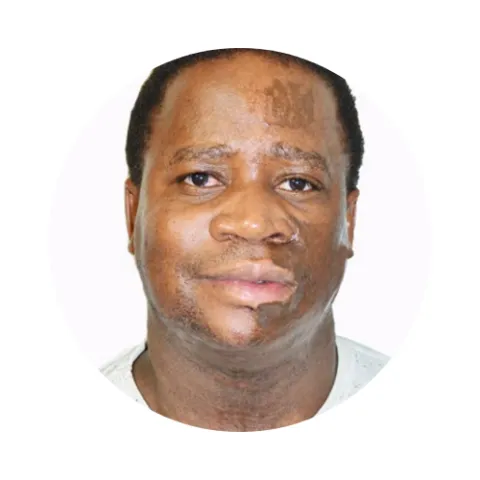
Teluleko Maseko, Eswatini National Cancer Control, Eswatini
Host Institution: International Agency for Research on Cancer, France
Project title: Reengineering cervical cancer screening and prevention strategies in Eswatini
Topic: Cancer prevention and early detection strategies, including vaccination and cancer screening
Screening has been proven to lower the incidence and mortality of colorectal cancer (CRC), and is applied as a public health service worldwide. Considering the constraints of colonoscopy capacity, a triage screening strategy involving a colonoscopy following a positive initial screening test, mainly fecal immunochemical test (FIT), has been widely used. A uniform positivity threshold was usually adopted in these FIT-based screening programs. However, substantial differences on both CRC risk and FIT performance are currently observed across different subgroups stratified by potential risk factors (e.g., age, sex, and family history), which greatly reduces the efficiency and cost-effectiveness of the screening programs. Thus far, the cost-effectiveness of FIT screening using personalized positivity threshold among different subgroups in CRC screening programs has not been comprehensively evaluated.
This project aims to establish a microsimulation model leveraging real-life and population-specific data from large-scale organized CRC screening programs in China and Korea. It will also evaluate the long-term effectiveness and cost-effectiveness of FIT screening using personalized positivity thresholds compared to the current screening with uniform thresholds. This study could provide important insights into policy decision-making for FIT-based screening, thereby maximizing the efficiency and benefits of these most common CRC screening programs worldwide.

Trang Nguyen, University Medical Center Ho Chi Minh City, Vietnam
Host Institution: Concord Hospital, Australia
Project title: Clinical Observership in Palliative care
Topic: Patient support, survivorship and palliative care
Screening has been proven to lower the incidence and mortality of colorectal cancer (CRC), and is applied as a public health service worldwide. Considering the constraints of colonoscopy capacity, a triage screening strategy involving a colonoscopy following a positive initial screening test, mainly fecal immunochemical test (FIT), has been widely used. A uniform positivity threshold was usually adopted in these FIT-based screening programs. However, substantial differences on both CRC risk and FIT performance are currently observed across different subgroups stratified by potential risk factors (e.g., age, sex, and family history), which greatly reduces the efficiency and cost-effectiveness of the screening programs. Thus far, the cost-effectiveness of FIT screening using personalized positivity threshold among different subgroups in CRC screening programs has not been comprehensively evaluated.
This project aims to establish a microsimulation model leveraging real-life and population-specific data from large-scale organized CRC screening programs in China and Korea. It will also evaluate the long-term effectiveness and cost-effectiveness of FIT screening using personalized positivity thresholds compared to the current screening with uniform thresholds. This study could provide important insights into policy decision-making for FIT-based screening, thereby maximizing the efficiency and benefits of these most common CRC screening programs worldwide.

Upeksha Karawita, Health Promotion Bureau, Sri Lanka
Host Institution: National Center for Immunization research and surveillance, Australia
Project title: Effectiveness of SBCC for HPV vaccine uptake in youth: A systematic review
Topic: Cancer prevention and early detection strategies, including vaccination and cancer screening
Screening has been proven to lower the incidence and mortality of colorectal cancer (CRC), and is applied as a public health service worldwide. Considering the constraints of colonoscopy capacity, a triage screening strategy involving a colonoscopy following a positive initial screening test, mainly fecal immunochemical test (FIT), has been widely used. A uniform positivity threshold was usually adopted in these FIT-based screening programs. However, substantial differences on both CRC risk and FIT performance are currently observed across different subgroups stratified by potential risk factors (e.g., age, sex, and family history), which greatly reduces the efficiency and cost-effectiveness of the screening programs. Thus far, the cost-effectiveness of FIT screening using personalized positivity threshold among different subgroups in CRC screening programs has not been comprehensively evaluated.
This project aims to establish a microsimulation model leveraging real-life and population-specific data from large-scale organized CRC screening programs in China and Korea. It will also evaluate the long-term effectiveness and cost-effectiveness of FIT screening using personalized positivity thresholds compared to the current screening with uniform thresholds. This study could provide important insights into policy decision-making for FIT-based screening, thereby maximizing the efficiency and benefits of these most common CRC screening programs worldwide.

Vinesia Lestari Riddi, Dharmais National Cancer Hospital, Indonesia
Host Institution: National Cancer Center Korea, South Korea
Project title: Strengthening Indonesia NCCP through Effective Prevention and Early Detection
Topic: Cancer prevention and early detection strategies, including vaccination and cancer screening
Screening has been proven to lower the incidence and mortality of colorectal cancer (CRC), and is applied as a public health service worldwide. Considering the constraints of colonoscopy capacity, a triage screening strategy involving a colonoscopy following a positive initial screening test, mainly fecal immunochemical test (FIT), has been widely used. A uniform positivity threshold was usually adopted in these FIT-based screening programs. However, substantial differences on both CRC risk and FIT performance are currently observed across different subgroups stratified by potential risk factors (e.g., age, sex, and family history), which greatly reduces the efficiency and cost-effectiveness of the screening programs. Thus far, the cost-effectiveness of FIT screening using personalized positivity threshold among different subgroups in CRC screening programs has not been comprehensively evaluated.
This project aims to establish a microsimulation model leveraging real-life and population-specific data from large-scale organized CRC screening programs in China and Korea. It will also evaluate the long-term effectiveness and cost-effectiveness of FIT screening using personalized positivity thresholds compared to the current screening with uniform thresholds. This study could provide important insights into policy decision-making for FIT-based screening, thereby maximizing the efficiency and benefits of these most common CRC screening programs worldwide.

Weimiao Wu, Zhejiang Cancer Hospital, China
Host Institution: National Cancer Center Korea, South Korea
Project title: Cost-effectiveness of colorectal cancer screening: a microsimulation model
Topic: Health economics, universal health coverage and policy, national cancer control plans
Screening has been proven to lower the incidence and mortality of colorectal cancer (CRC), and is applied as a public health service worldwide. Considering the constraints of colonoscopy capacity, a triage screening strategy involving a colonoscopy following a positive initial screening test, mainly fecal immunochemical test (FIT), has been widely used. A uniform positivity threshold was usually adopted in these FIT-based screening programs. However, substantial differences on both CRC risk and FIT performance are currently observed across different subgroups stratified by potential risk factors (e.g., age, sex, and family history), which greatly reduces the efficiency and cost-effectiveness of the screening programs. Thus far, the cost-effectiveness of FIT screening using personalized positivity threshold among different subgroups in CRC screening programs has not been comprehensively evaluated.
This project aims to establish a microsimulation model leveraging real-life and population-specific data from large-scale organized CRC screening programs in China and Korea. It will also evaluate the long-term effectiveness and cost-effectiveness of FIT screening using personalized positivity thresholds compared to the current screening with uniform thresholds. This study could provide important insights into policy decision-making for FIT-based screening, thereby maximizing the efficiency and benefits of these most common CRC screening programs worldwide.
Last update
Tuesday 02 December 2025